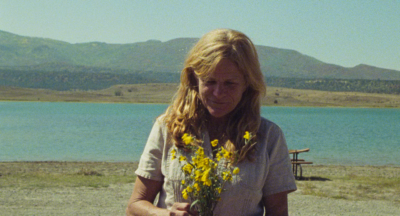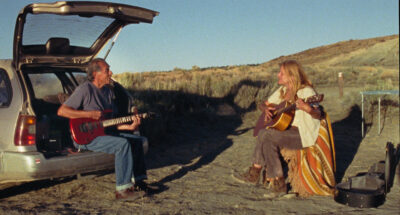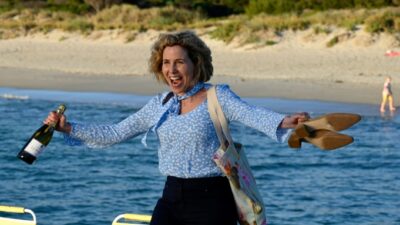“This movie is great on whatever-sized screen you watch, but it’s next-level in a full theater with a rabid audience.” The spectacular RRR, back in theaters by popular demand.
Catch RRR starting August 26 at the Monica Film Center and Town Center and a week or two after that at the Claremont and Newhall. All are venues where we have not previously screened the film.

“Cristina Cacioppo programmed RRR at the Nitehawk Prospect Park in Brooklyn, where it drew enthusiastic moviegoers in the 20-to-30 age range, most from outside the Indian diaspora. “There was an overall wave of joy throughout,” Cacioppo said by email, adding later. “You could feel the room smiling, the jaws dropping.”

“The longest feature on my list runs more than three hours and earns every supercharged minute. Already the second-highest-grossing Indian film of all time in America (it’s grossed more than $140 million worldwide), S.S. Rajamouli’s Telugu-language sensation is a hellaciously entertaining mash-up of history and legend, politics and romance, hyperviolent action and song-and-dance musical, venomous snakes and throat-mauling tigers. As the two mighty warriors whose tender bromance becomes a truly infernal affair, N.T. Rama Rao Jr. and Ram Charan are forces of nature.”
(Side note: even though Justin included the film in his Top 10, the film still hasn’t actually had a full review in the Times. Yet another example of good films not getting reviewed by the tragically thin Times film section.)

Finally, Variety just published a story headlined “How India’s Action Epic RRR Could Bring the Country’s First Oscar Nom in 21 Years.”
“A movie with the action sensibilities of James Cameron and the ambitious scope of George Miller has to be considered a definitive Oscar contender, right? Not without the proper backing by a studio or, in this case, a country that will submit your film for the Academy’s best international feature award.
“Enter RRR, a film directed by S. S. Rajamouli, who wrote the script with V. Vijayendra Prasad. The three-hour action epic follows two patriotic but philosophically opposed men (Ram Charan and N.T. Rama Rao Jr.), who team up to rescue a girl from British colonial officials in 1920s Delhi.

“When the 94th Oscar nominations were announced back in January 2022, India’s official submission “Pebbles” was not among the films recognized for international feature. It marked exactly 20 years since India’s last nom in the category.
“In fact, only three Indian films in total —Mother India (1957), Salaam Bombay! (1988) and Lagaan (2001) — have been nominated for the award. The last of which lost to No Man’s Land from Bosnia and Herzegovina.
“The skyrocketing success of RRR has been the undercover Cinderella story of the year. A global smash with huge box office receipts, the film found a pathway to the American cultural zeitgeist with consumers discovering it on Netflix. It was distributed theatrically by Variance Films in the U.S., and a current trend by the Academy to embrace non-English language features in the last few years offers an alternative pathway to awards recognition if India decides to look elsewhere. But why would they?”
Read the rest of the piece here.
A LOVE STORY: Veteran character actor Dale Dickey shines in the role of her career.
“Like a coy, concise short story you might remember having read years ago, A Love Song is the simplest of tales, but there’s a complex universe of longing contained within it.” ~ Bilge Ebiri, New York Magazine/Vulture

“It’s well-photographed, unobtrusively edited, full of wondrous sights, and acted by a couple of masters of warm underplaying.” ~ Glenn Kenny, RogerEbert.com

#BringBackMovieReviews: Marketplace on Nashville’s Belcourt Theatre
The journalists at the American Public Media business and economic news radio program Marketplace do in-depth reporting by repeatedly profiling and interviewing people, establishing long-term relationships they return their listeners to. One such person is Stephanie Silverman, executive director of the Belcourt Theatre, a non-profit movie theater in Nashville. Kai Ryssdal, the host and senior editor of Marketplace, recently spoke with Silverman again about adjusting to the pandemic and streaming. She is an extremely articulate advocate for the theatrical experience and what she said in the interview — “studios are understanding that the long tail for their movie happens when it starts in exhibition…it needs the word-of-mouth energy that only exhibition spaces can give it” — relates directly to what we’ve been advocating for recently in regards to the L.A. Times film section. Traditionally, talented, knowledgeable film critics guide moviegoers to culturally and artistically important films they might have otherwise missed. Filmmakers and film lovers alike rely on the critics for this and the film critics rely on big platforms like the Times. It is a crucial step in the process that makes unique, fine films and their L.A. theatrical exhibition possible. If the paper of record in the movie capital of the world abdicates its role, film culture suffers. We run the risk of a monoculture consisting of superheroes and sequels. #BringBackMovieReviews
“A gorgeous clarion call for our young Black girls, heralding the community, creativity and confidence that is the pride of our culture.” ~ Ava DuVernay on ALMA’S RAINBOW, opening August 9.
A coming-of-age comedy-drama about three Black women living in Brooklyn, Ayoka Chenzira’s 1993 film Alma’s Rainbow explores the life of teenager Rainbow Gold, who is entering womanhood and navigating conversations and experiences around standards of beauty, self-image, and the rights Black women have over their bodies. We are thrilled to open the film next Friday, August 12 at the Monica Film Center.
Victoria Platt, who starred as Alma, will participate in a Q&A after the evening screening on Saturday, August 13th, exact showtime TBA.
All screenings of Alma’s Rainbow will be preceded by Ms. Chenzira’s 10-minute animated short film Hair Piece: A Film for Nappy Headed People (1984).

“With a whole lot of heart and humor, Ayoka Chenzira’s Alma’s Rainbow is a stunning exploration of Black identity and the dynamism of Black women’s lives.” – Maya Cade, Black Film Archive creator
“The matter of matriarchy within families is close to my heart. I think of my great-grandmother, my grandmother, my mother, and my aunts who all had a firm, beautiful hand in raising me. I long for more representations of these generational villages on screen, like those we experience in Ayoka Chenzira’s work. Ms. Chenzira’s Alma’s Rainbow is a gorgeous clarion call for our young Black girls, heralding the community, creativity and confidence that is the pride of our culture.” —Ava DuVernay, producer-director

“I am delighted to have this opportunity to join you in presenting Dr. Ayo Chenzira’s first feature film. As you know, Alma’s Rainbow was one of the first full length dramatic narrative films produced and directed by an African American woman in the 20th century. Chenzira’s much celebrated and award winning early work is essential viewing today as much as it was when first released in 1994.” —Julie Dash, filmmaker

Director’s Statement: “I could write a book on the response to Alma’s Rainbow. The film took a long time to make. I raised all the money independently. Distributors came and looked at the film, and there was a real split between what the men thought about it and what the women thought about it. The response by women has been overwhelmingly positive. The response by men, who write the checks, was that it was not an action piece. There was no Black pathology; there was no movie point of reference for three Black women driving a story. They also see that it is not a linear narrative in the tradition of exposition, climax and resolution. The editing and storytelling are based on the emotions of the characters. This is something that women understood and men did not.

“We found a distributor who was not interested in selling it only to twenty-something White guys in the suburbs. Unfortunately, the arrangement with the distributor and our company did not work out; we did get the film back, however, unencumbered. This film grows out of mothers being afraid of their daughters’ own budding sensuality.” – Ayoka Chenzira, Ph.D.
Promote the general welfare: mask against COVID.
From Laemmle Theatres President Greg Laemmle:
More on movie reviews: Ira Deutchman on “Seven Ways The New York Times Could Help Save Theatrical Moviegoing and Its Own Bottom Line.”
Winning Australian sex comedy HOW TO PLEASE A WOMAN opens July 22 at the Monica Film Center.
How to Please a Woman stars the brilliant comic actress Sally Phillips, who was killed as the Finnish prime minister Minna Häkkinen on Veep. A funny, heartwarming liberation story for women who have been afraid to ask for what they want – at home, at work and in the bedroom. Phillips plays Gina, how has lost her job and feels stuck and frustrated in a passionless marriage. She has always lived life on the sidelines – that is, until she is met with a groundbreaking business opportunity of converting a team of well-built moving guys into well-built housecleaners.

“Arriving like a horny bus to a public transport orgy, this is the second comedy in a matter of weeks, after Good Luck to You, Leo Grande, about women hiring sex workers. Be that a happy coincidence or the start of a trend, it’s cheering that both films are so entertaining, body positive and upbeat but still entirely different experiences.” ~ Leslie Felperin, The Guardian
“This is a rare film that makes you feel lighter, fresher, and fully revitalized after watching it.” ~ Andrew F. Peirce, The Curb
- « Previous Page
- 1
- …
- 15
- 16
- 17
- 18
- 19
- …
- 73
- Next Page »
